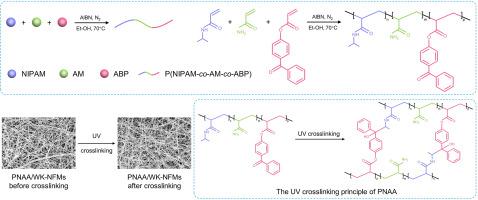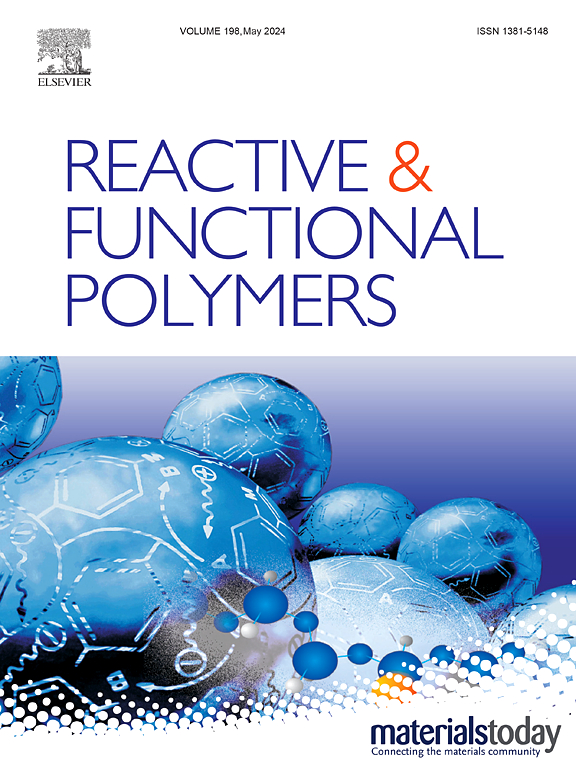Preparation and performance study of thermo-responsive P(NIPAM-AM-ABP)/keratin composite nanofiber membrane for bio-application
IF 4.5
3区 工程技术
Q1 CHEMISTRY, APPLIED
引用次数: 0
Abstract
This paper describes a temperature-responsive composite nanofibrous membrane by blending of the P(NIPAM-AM-ABP) (PNAA) nanofiber and the wool keratin (WK) nanofiber. The photo crosslinkable PNAA with the LCST value of 38.1 °C was obtained by free radical copolymerization of the temperature sensitive N-Isopropylacrylamide (NIPAM) monomer, the hydrophilic monomer Acrylamide (AM), and the photo crosslinkable monomer 4-Acryloyloxybenzophenone (ABP). Keratin was extracted from waste wool fiber by reduction method. The PNAA nanofiber (PNAA-NF) and the keratin nanofiber (WK-NF) were electoral spun separately by two-needle parallel spinning, and the obtained composite nanofiber membrane was then crosslinked by UV irradiation and heat treatments to prepare the PNAA/WK nanofiber membrane (PNAA/WK-NFM) with good water tolerance. The result indicated that the photo cross-linkable temperature sensitive PNAA with the LCST of 38.1 °C was successfully synthesized. The obtained PNAA/WK-NFM has a good fibrous morphology and excellent water tolerance. The composite nanofiber membrane showed good reversible temperature sensitivity and temperature responsive drug releasing property due to the PNAA. By combining of the PNAA-NF and WK-NF, the mechanical property of the PNAA/WK-NFM was greatly enhanced in both dry and wet states, and the slow drug releasing property of the membrane was further improved. In-vitro cell culture experiments indicated that the PNAA/WK-NFM has a good biocompatibility with no cytotoxicity. These findings suggested that the PNAA/WK-NFM has a potential application in temperature responsive drug releasing biomaterials.

用于生物应用的热响应 P(NIPAM-AM-ABP)/角蛋白复合纳米纤维膜的制备和性能研究
本文介绍了一种由 P(NIPAM-AM-ABP)(PNAA)纳米纤维和羊毛角蛋白(WK)纳米纤维混合制成的温度响应型复合纳米纤维膜。光交联型 PNAA 的 LCST 值为 38.1 °C,由对温度敏感的 N-异丙基丙烯酰胺(NIPAM)单体、亲水性单体丙烯酰胺(AM)和光交联型单体 4-丙烯酰氧基二苯甲酮(ABP)通过自由基共聚而得。采用还原法从废羊毛纤维中提取角蛋白。采用双针并行纺丝法分别纺制 PNAA 纳米纤维(PNAA-NF)和角蛋白纳米纤维(WK-NF),然后将得到的纳米纤维复合膜通过紫外光照射和热处理进行交联,制备出具有良好耐水性的 PNAA/WK 纳米纤维膜(PNAA/WK-NFM)。结果表明,成功合成了 LCST 为 38.1 ℃ 的光交联温度敏感型 PNAA。所获得的 PNAA/WK-NFM 具有良好的纤维形貌和优异的耐水性。由于 PNAA 的存在,复合纳米纤维膜具有良好的可逆温度敏感性和温度响应药物释放特性。通过将 PNAA-NF 与 WK-NF 相结合,PNAA/WK-NFM 在干湿两种状态下的机械性能都得到了大幅提高,膜的缓释性也得到了进一步改善。体外细胞培养实验表明,PNAA/WK-NFM 具有良好的生物相容性,且无细胞毒性。这些研究结果表明,PNAA/WK-NFM 有潜力应用于温度响应型药物释放生物材料。
本文章由计算机程序翻译,如有差异,请以英文原文为准。
求助全文
约1分钟内获得全文
求助全文
来源期刊

Reactive & Functional Polymers
工程技术-高分子科学
CiteScore
8.90
自引率
5.90%
发文量
259
审稿时长
27 days
期刊介绍:
Reactive & Functional Polymers provides a forum to disseminate original ideas, concepts and developments in the science and technology of polymers with functional groups, which impart specific chemical reactivity or physical, chemical, structural, biological, and pharmacological functionality. The scope covers organic polymers, acting for instance as reagents, catalysts, templates, ion-exchangers, selective sorbents, chelating or antimicrobial agents, drug carriers, sensors, membranes, and hydrogels. This also includes reactive cross-linkable prepolymers and high-performance thermosetting polymers, natural or degradable polymers, conducting polymers, and porous polymers.
Original research articles must contain thorough molecular and material characterization data on synthesis of the above polymers in combination with their applications. Applications include but are not limited to catalysis, water or effluent treatment, separations and recovery, electronics and information storage, energy conversion, encapsulation, or adhesion.
 求助内容:
求助内容: 应助结果提醒方式:
应助结果提醒方式:


